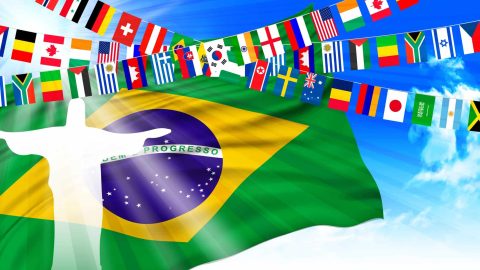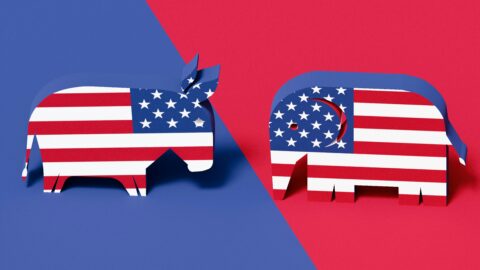Brazil is locked into a severe recession in 2016, the year of the Olympic Games in Rio de Janeiro. After negative growth of 2.5% last year, the economy will be shrinking by more than 3% in 2016. Political crises and corruption scandals in connection with the oil company Petrobras have badly affected the country. But still, the country, shaken by crisis, is in strong demand from investors.
The importance of Brazil has declined
Especially in the equity segment, the relevance of Brazil has declined in recent years. A few years ago the BRIC economies (Brazil, Russia, India, and China) were hugely popular among investors. Mismanagement and the unfavourable development of international commodity exchanges have eaten into the weighting of Brazil in the global …
… equity index (MSCI World All Countries) and reduced it to now only 1%.

Source: Thomson Reuters Datastream; Data as of 4th August 2016; the chart does not include any kind of fees or taxes; past performance is not a good indicator for future developments.
A new hope: the interim government
At the launch of the impeachment proceedings of President Dilma Rousseff around mid-May of 2016, an interim, pro-business government headed by Vice President Michel Temer was appointed for the period until the next election in 2018. One of the biggest challenges is the high budget deficit, which increased to about 10% under Rousseff’s cabinet. In order to tame this deficit, the new government announced several reforms; among them a reform of the loss-making social and pension insurance, which represents the biggest item of the public budget. Also, plans are for the energy sector to be opened to private investors, and for the indexation of wages and social benefits to be lifted. The government also intends to do away with the minimum spending constitutionally stipulated for education and healthcare, to simplify taxes, and to improve the rule of law for investors. In addition, the government wants to privatise public bodies such as the aviation regulatory authority. Overdue infrastructure measures are to be financed by pubic-private partnerships (PPP). The government wants to grant private companies licences for airports, ports, and motorways. Overall, all of that sounds very reasonable.
Brazil’s problems are of a structural nature
Brazil’s problems are of a structural nature. The high dependence on its natural resources is the biggest problem in this context. In spite of all the diversification measures taken, the development of the country still depends on the international commodity markets. Not all sectors are currently facing the same difficulties as the oil and ore industry. For example, the agricultural sector and the cellulose industry currently benefit from favourable exchange rates.
The Brazilian equity market

Source: Thomson Reuters Datastream; Data as of 4th August 2016; the chart does not include any kind of fees or taxes; past performance is not a good indicator for future developments.
Brazil overweighted in equities
The current weighting of Brazil in the MSCI Latin America index accounts for slightly more than 50%, which makes the country the biggest equity market in Latin and South America. In our global emerging equity markets equity fund we have slightly overweighted Brazil due to the new pro-business economic policy and the historically low valuation. In terms of sectors, we currently favour financials, property developers, and private education institutions. In the energy sector, especially when it comes to Petrobras, we advise caution. The highly indebted oil group might tear a hole worth billions into the public budget. The group is faced with potential settlement payments due to investment fraud, as a result of which the partially state-owned company might then have to fall back on a bail-out from the government, i.e. a cash injection.
Commodity prices and politics determine Brazil’s sustainable comeback
Brazil’s comeback depends largely on the development of commodity prices. Foreign investors will be cautious about their commitment as long as the political crisis has not been fully overcome.
LINK to our global emerging markets equity fund: http://www.erste-am.at/de/private_anleger/unsere-fonds/suche/1-34301/overview
Legal disclaimer
This document is an advertisement. Unless indicated otherwise, source: Erste Asset Management GmbH. The language of communication of the sales offices is German and the languages of communication of the Management Company also include English.
The prospectus for UCITS funds (including any amendments) is prepared and published in accordance with the provisions of the InvFG 2011 as amended. Information for Investors pursuant to § 21 AIFMG is prepared for the alternative investment funds (AIF) administered by Erste Asset Management GmbH pursuant to the provisions of the AIFMG in conjunction with the InvFG 2011.
The currently valid versions of the prospectus, the Information for Investors pursuant to § 21 AIFMG, and the key information document can be found on the website www.erste-am.com under “Mandatory publications” and can be obtained free of charge by interested investors at the offices of the Management Company and at the offices of the depositary bank. The exact date of the most recent publication of the prospectus, the languages in which the fund prospectus or the Information for Investors pursuant to Art 21 AIFMG and the key information document are available, and any other locations where the documents can be obtained are indicated on the website www.erste-am.com. A summary of the investor rights is available in German and English on the website www.erste-am.com/investor-rights and can also be obtained from the Management Company.
The Management Company can decide to suspend the provisions it has taken for the sale of unit certificates in other countries in accordance with the regulatory requirements.
Note: You are about to purchase a product that may be difficult to understand. We recommend that you read the indicated fund documents before making an investment decision. In addition to the locations listed above, you can obtain these documents free of charge at the offices of the referring Sparkassen bank and the offices of Erste Bank der oesterreichischen Sparkassen AG. You can also access these documents electronically at www.erste-am.com.
Our analyses and conclusions are general in nature and do not take into account the individual characteristics of our investors in terms of earnings, taxation, experience and knowledge, investment objective, financial position, capacity for loss, and risk tolerance. Past performance is not a reliable indicator of the future performance of a fund.
Please note: Investments in securities entail risks in addition to the opportunities presented here. The value of units and their earnings can rise and fall. Changes in exchange rates can also have a positive or negative effect on the value of an investment. For this reason, you may receive less than your originally invested amount when you redeem your units. Persons who are interested in purchasing units in investment funds are advised to read the current fund prospectus(es) and the Information for Investors pursuant to § 21 AIFMG, especially the risk notices they contain, before making an investment decision. If the fund currency is different than the investor’s home currency, changes in the relevant exchange rate can positively or negatively influence the value of the investment and the amount of the costs associated with the fund in the home currency.
We are not permitted to directly or indirectly offer, sell, transfer, or deliver this financial product to natural or legal persons whose place of residence or domicile is located in a country where this is legally prohibited. In this case, we may not provide any product information, either.
Please consult the corresponding information in the fund prospectus and the Information for Investors pursuant to § 21 AIFMG for restrictions on the sale of the fund to American or Russian citizens.
It is expressly noted that this communication does not provide any investment recommendations, but only expresses our current market assessment. Thus, this communication is not a substitute for investment advice.
This document does not represent a sales activity of the Management Company and therefore may not be construed as an offer for the purchase or sale of financial or investment instruments.
Erste Asset Management GmbH is affiliated with the Erste Bank and austrian Sparkassen banks.
Please also read the “Information about us and our securities services” published by your bank.


